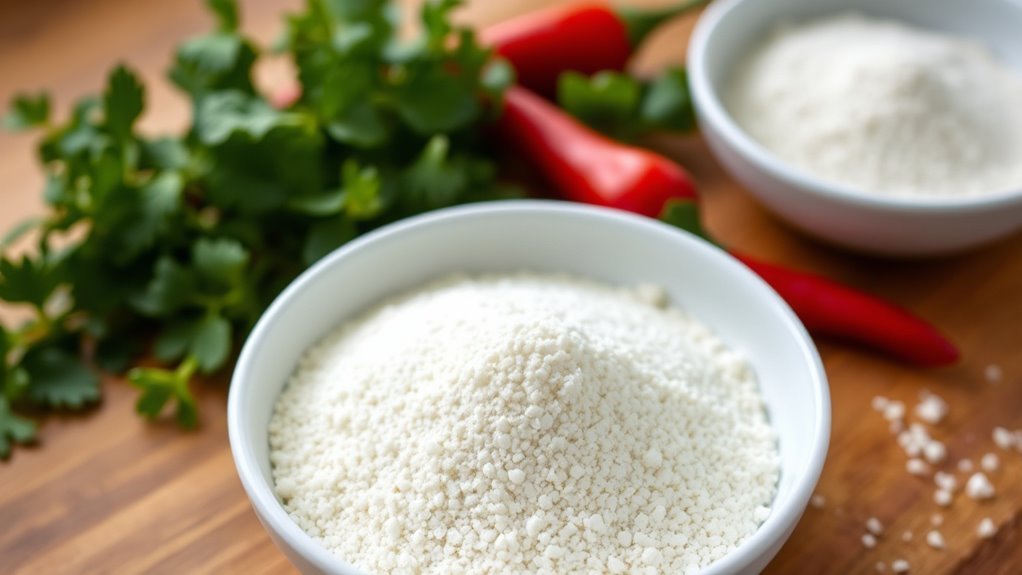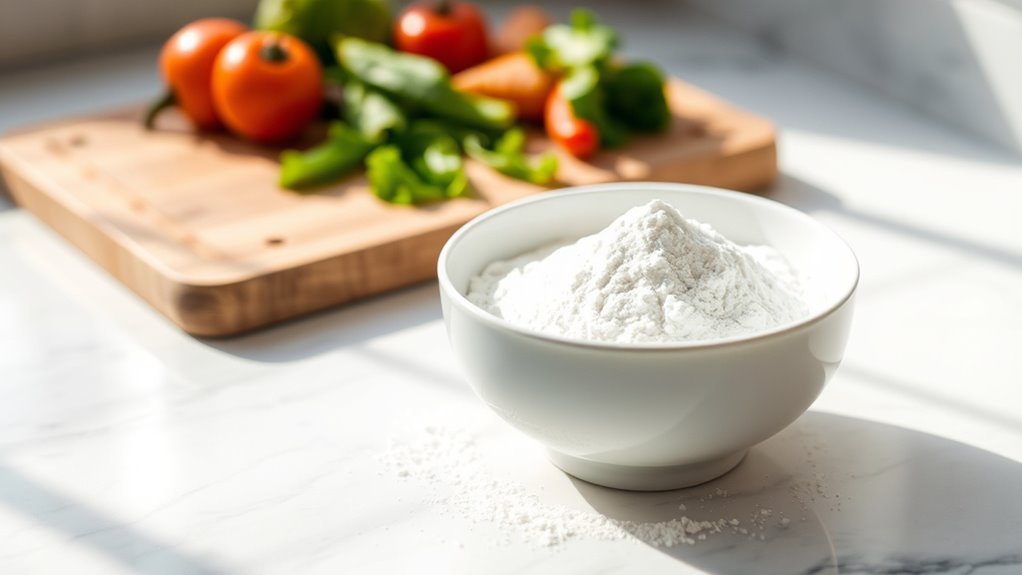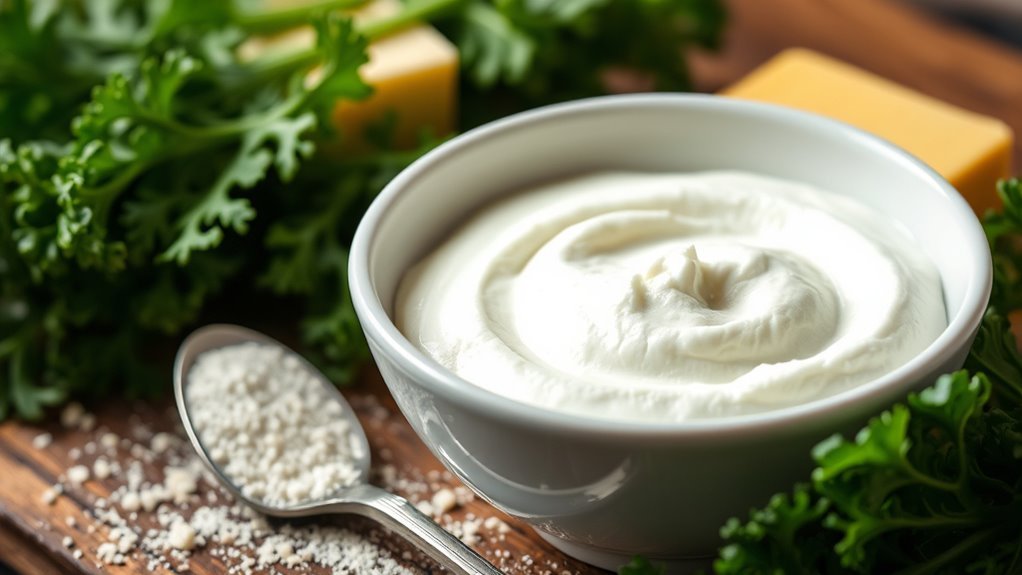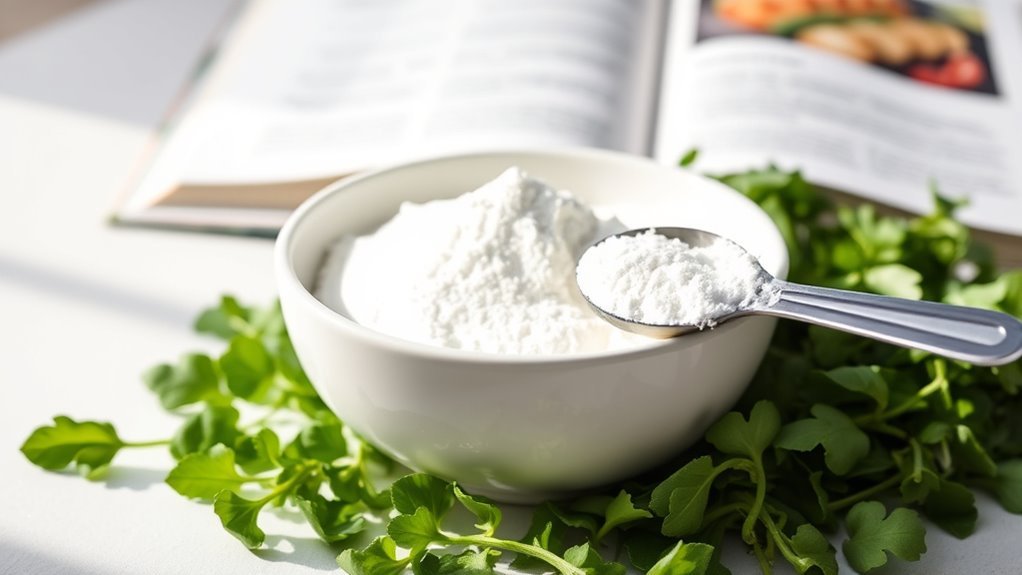Cornstarch isn’t keto-friendly due to its high carbohydrate content, containing about 91 grams of carbs per 100 grams. This can disrupt ketosis, causing spikes in blood sugar and cravings for more carbs. Even small amounts can stall your progress. Instead of using cornstarch, consider keto-friendly alternatives like xanthan gum or guar gum to achieve the desired texture in your dishes. There’s more to explore regarding maintaining a ketogenic lifestyle effectively.
Nutritional Profile of Cornstarch

When examining the nutritional profile of cornstarch, you’ll find it’s primarily composed of carbohydrates, making it a high-calorie ingredient. With about 30 grams of carbohydrates per ¼ cup serving, its caloric content is significant, totaling around 120 calories. This carbohydrate breakdown consists mainly of starch, which your body quickly converts into glucose for energy. While this can be beneficial for immediate fuel, it may not align with low-carb dietary goals. The rapid digestion of cornstarch can lead to spikes in blood sugar levels, which might not be ideal for those seeking balanced energy. So, when considering its use in your meals, it is crucial to weigh these factors against your personal dietary choices and health objectives.
Impact of Cornstarch on Ketosis

The high carbohydrate content in cornstarch poses a significant challenge for those aiming to maintain ketosis, a metabolic state characterized by low carbohydrate intake and increased fat utilization for energy. Consuming cornstarch can disrupt ketosis effects, leading to increased glucose levels and a potential shift back to carbohydrate metabolism.
The high carbohydrate content of cornstarch can significantly disrupt ketosis, pushing the body back to carbohydrate metabolism.
- Cornstarch contains about 91 grams of carbohydrates per 100 grams, making it a poor choice for keto diets.
- Even small amounts can hinder your ability to stay in ketosis, as your body may revert to burning carbs instead of fats.
- Regular intake could lead to cravings for more carbohydrates, making it harder to stick to a keto lifestyle.
Potential Uses of Cornstarch in Cooking

Although cornstarch is not suitable for a ketogenic diet, it has several valuable uses in cooking that can enhance texture and consistency in various dishes. You can use it as a thickening agent in sauces, soups, and gravies, providing a smooth, velvety finish. Its ability to absorb moisture helps stabilize mixtures, making it a reliable choice for achieving desired thickness. Additionally, as a baking substitute, cornstarch can improve the lightness and tenderness of baked goods when combined with flour. By creating a delicate crumb, it elevates your culinary creations. While not keto-friendly, understanding these applications can help you appreciate cornstarch’s role in traditional cooking, allowing for a more versatile approach in the kitchen.
Keto-Friendly Alternatives to Cornstarch
For those following a ketogenic diet, it’s important to find alternatives to cornstarch that align with low-carb principles while still achieving similar culinary results. Luckily, there are several keto-friendly thickeners you can use as low carb substitutes:
- Xanthan Gum: A small amount goes a long way in thickening sauces and soups without adding carbs.
- Guar Gum: This natural thickener is derived from guar beans and is low in calories and carbohydrates.
- Psyllium Husk: Often used in gluten-free baking, it can also act as a thickening agent while enhancing fiber content.
Tips for Navigating a Ketogenic Lifestyle
When you’re maneuvering a ketogenic lifestyle, understanding the nuances of carbohydrate intake is essential for maintaining ketosis. To stay on track, effective meal planning is vital. Focus on high-fat, low-carb foods like avocados, nuts, and fatty fish. Preparing meals in advance not only saves time but also helps you avoid impulse snacking on non-keto options.
For your snack options, consider keto-friendly choices such as cheese, olives, or hard-boiled eggs. These options keep you satisfied without derailing your carb count.
Frequently Asked Questions About Cornstarch and Keto Diet
1. Is cornstarch keto friendly?
Cornstarch is generally not considered keto-friendly. While it is a carbohydrate, the ketogenic diet focuses on high-fat and low-carb intake to induce ketosis. Cornstarch contains about 30 grams of carbohydrates per 1/4 cup, which can easily exceed the daily carb limit for those on a strict keto diet, typically set between 20-50 grams of net carbs.
2. What is the carbohydrate content in cornstarch?
Cornstarch is predominantly made up of carbohydrates. Specifically, it contains about 30 grams of carbohydrates per 1/4 cup serving. This high carbohydrate content makes it unsuitable for those following a ketogenic diet, which aims for a significant reduction in carbohydrate intake.
3. Are there keto-friendly alternatives to cornstarch?
Yes, there are several keto-friendly alternatives to cornstarch. Popular substitutes include almond flour, coconut flour, and psyllium husk. These alternatives contain fewer carbohydrates and can be used in various recipes for thickening or baking. Another option is using xanthan gum or guar gum, which are low in carbs and effective as thickeners.
4. Can I use cornstarch in small amounts on a keto diet?
While it may be tempting to use cornstarch in small amounts, it’s important to remember that even a small serving can add significant carbs to your diet. If you are strictly adhering to a ketogenic lifestyle, it’s best to avoid cornstarch altogether and opt for low-carb alternatives instead. However, if you are following a more flexible low-carb diet, you may be able to incorporate tiny amounts, keeping track of your total carb intake.
5. What are the potential effects of consuming cornstarch on a keto diet?
Consuming cornstarch on a keto diet can hinder your progress toward achieving ketosis. The high carbohydrate content can lead to increased blood sugar levels, which may result in a state of insulin resistance, making it difficult for your body to burn fat efficiently. This can ultimately stall weight loss efforts and affect energy levels. Maintaining a strict low-carb intake is crucial for those aiming to reap the benefits of a ketogenic lifestyle.
References
- https://www.ncbi.nlm.nih.gov/pmc/articles/PMC6520857/
- https://www.healthline.com/nutrition/keto-diet-foods#grains-and-starches
- https://www.webmd.com/diet/what-to-eat-on-a-keto-diet
- https://www.medicalnewstoday.com/articles/323591
- https://www.dietdoctor.com/low-carb/keto
- https://www.health.harvard.edu/staying-healthy/the-ketogenic-diet
- https://www.cdc.gov/nutrition/index.html


